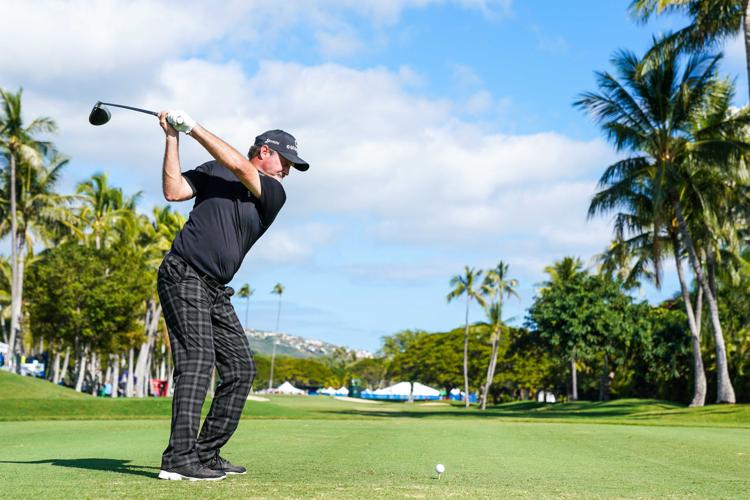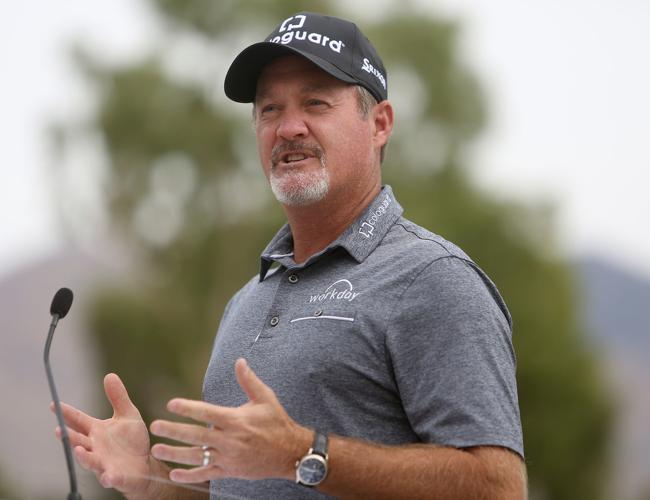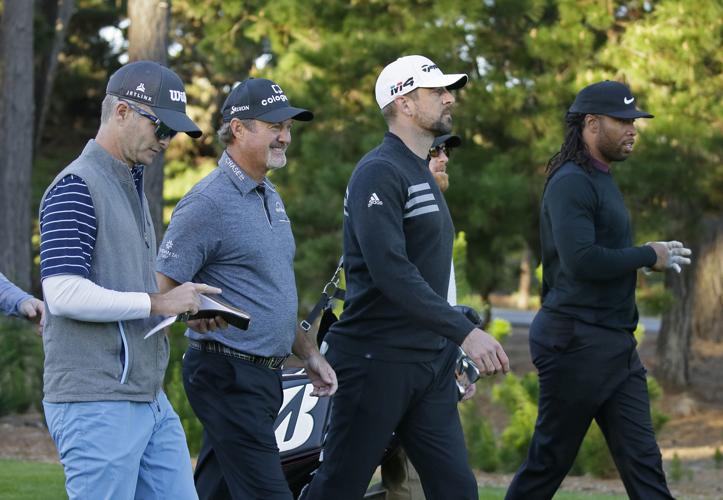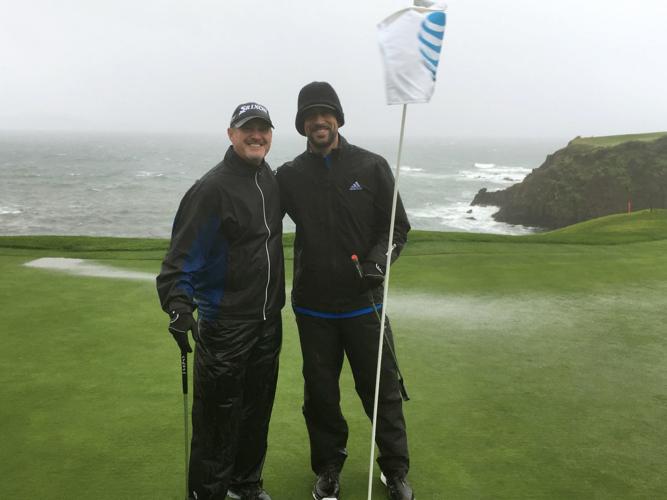Jerry Kelly is no stranger to internal conflict. The longtime PGA Tour pro has been seeking the proper balance between intensity and restraint for his entire career.
“Maybe if my mental side would have been better, I would have won many more,” said Kelly, who’s about to make his second PGA Tour Champions appearance in Tucson at the Cologuard Classic.
“Yet if I didn’t have this drive, this all-consuming drive, maybe I wouldn’t have won any. Maybe I never would have made it.”
Kelly is known for what he once described to the Wisconsin State Journal as his “fiery disposition” – a product of his Irish heritage and hockey-playing youth. “I always liked to dig in the corners,” the Madison, Wisconsin, resident said.
That mentality has helped Kelly grind out a career that has lasted almost 30 years and has seen him win more than $30 million. It’s also difficult to sustain success in a sport that demands composure and precision when you’re beating yourself up all the time.
Kelly found that equilibrium about three-fourths of the way through his first Champions Tour season – recording the first of three victories in a seven-event span. Since that win at the Boeing Classic, Kelly has finished lower than sixth just once. He opened this year with a win at the Mitsubishi Electric Championship in Hawaii and ranks second in the Schwab Cup standings entering the Cologuard Classic.
Kelly, 51, is a spokesman for Cologuard and has become an advocate for early screening and detection of colorectal cancer. It’s hard to find anyone who hasn’t been affected by cancer in some way; Kelly’s wife, Carol, had late-stage melanoma 20 years ago. “It was a little scary, to say the least,” Kelly said.
Carol survived. On the golf course, her husband eventually thrived.
Kelly discussed his career, his determination, his friendship with a certain Green Bay Packers quarterback and other topics in a recent phone conversation with the Star. Here’s a portion of that chat, which has been lightly edited for context and clarity:
How would you describe the transition from the PGA Tour to the PGA Tour Champions?
A: “It was difficult. It’s very much a different mindset. I was playing much longer courses, tougher courses for me as I had gotten older and not as strong. I did well in places that rewarded par. Well, there’s not a place out on the Champions Tour that rewards par. These guys are playing some serious golf. You can’t have one bad round. You can’t have one mediocre round. You’ve gotta have three good rounds, or two good rounds and a great round. There is no room for a 2- or a 3-under. If you have one of those off rounds, you’re not going to have a chance.
“It’s an eye-opening experience, and it’s definitely a change of mentality. That’s tough to do right away. Plus, you’re a rookie again. That means you’re playing courses for the first time, where other guys have been playing them for years. That’s a huge difference.”
You had a breakthrough last August at the Boeing Classic. Did something special happen that weekend, or did you just reach the point where you felt more comfortable?
A: “I think it definitely reached a point where it was like, ‘All right, quit beating your head against the wall. Try to have some fun.’ It was kind of surreal how it fell together. You don’t think this is much, but changing shoes, that was a big (deal) for me. And then changing clubs. I changed irons that week. I changed putters that week. So everything was kind of new. It kind of aligned with, ‘OK, whatever, no expectations. Just go out there and see how this stuff works.’ And it worked great.
“You’re always going to go through ups and downs in this game. Tiger (Woods) is the only one who’s done it all the way through. It’s a once-in-a-generation thing.”
But looking at your career, you’ve been pretty consistent.
A: “I’ve always been consistent because I’ve never lost the drive to compete. The adrenaline has never gone away. Some guys, once they attain something, (they) relax. I’ve never relaxed.
“I just had that conversation with my wife last night. We’re starting to go down that slope. You’re attaining some success, and now you’re looking: ‘Where is your next success?’ And you’re putting more pressure on yourself again. And the reason you got the success was you took the pressure off.
“So I’m kind of sliding backwards again mentally. I could feel it last week (at the Feb. 16-18 Chubb Classic, where he finished in a tie for 36th). It was the first time I had been No. 1. It definitely provided a little more adrenaline. You try to handle it. (Sometimes) it helps, and sometimes it hurts.”
You’ve been waging that internal battle your whole career.
A: “Every golfer. Every athlete. Every single person. Everything is an internal battle. Some people make it external and hold other people accountable rather than looking inside. I know it’s all me. I’ve got nobody to blame but myself. You just find a way to make it better. You don’t learn as much from winning as you do from losing. I actually learned more last week than I had in the wins and the good times before it.”
You played hockey growing up. You were an all-city performer. Is that how you ended up at the University of Hartford?
A: “My family was an insurance family. It was important to me to prepare myself for life without golf – going to a place where I knew I could have some high-level internships in the insurance industry. I knew they were going to Division I in their hockey program, and I was going to be really excited to play hockey for them. Then I got there, and they dropped the program. Which is the best thing that ever happened to me.
“Let’s be real: It would have been cool (to play both hockey and golf), but I probably wouldn’t have ended up where I ended up. Those things happen for a reason.”
You’re playing in the pro-am with Aaron Rodgers. How did you become friends with him?
A: “I first met him at Andy North’s Pro-Am. Probably seven or eight years ago. I cruised up to the group. He was actually playing with my brother. I dropped the balls and said, ‘OK, let’s go, guys. Closest to the pin.’ I put one about 5 feet; he knocked one to about 6 inches. I was like, ‘All right, you’re a gamer, I get it.’
“We just stayed in contact. We said, ‘Boy, it would be cool to play in the AT&T (Pebble Beach Pro-Am) sometime.’ I got ahold of the tournament director and made it happen. We’ve been playing for six years and having a great time.”
How would you describe his golf game?
A: “His golf game is strong. It’s tough for athletes to channel their strength correctly. He’s strong in the arms and hands and upper body. That can overtake legs if you don’t know how to use them. When he has time someday, he could get down to a scratch.”
He also seems extremely flexible. That must help too.
A: “We’ve talked a lot about that. He explodes upwards while he throws. It’s rotation going upwards. That’s very similar to, say, Justin Thomas, where he’s almost off the ground, on his toes, hitting a golf ball. It’s helped me understand how some of these young guys swing. I can try to emulate (them), but I don’t quite have that.”
What is Aaron’s personality like? From afar, he seems pretty chill.
A: “He’s very reserved. He’s very intelligent. He’s not going to be the one who pops off about something and gets in trouble for it. He’s got his opinions, but he knows when and where. His personality suits to leading by example. When he does speak, you’re going to listen.”
Was there a certain point in your career that you would cite as the turning point? When you realized you could do this and make it a career?
A: “I always felt like I was good enough to be on the PGA Tour. I spent six years trying to get to the PGA Tour. And then I took No. 1 on the Nike Tour, which is now the Web.com. That gets you the ticket. But I lost in a playoff my rookie year in Milwaukee, which was like my fifth major. That kind of set the tone. If I would have won, I could have been one of those guys who relaxed early. But I lose in a playoff my rookie year, and the next thing you know, I don’t win for 200 starts.
“I expected it right away. But I kept on grinding and working. I never was one of those guys who’d relax and wait for the majors to come. I’d have to grind to keep my card every single year. That’s why there aren’t many grinders who have played 22 straight years. It’s a pain in the (butt) to have to do that every year.
“I didn’t win a major. I didn’t win as much as I wanted to. But I did it with the best in the world for a really long time.”







